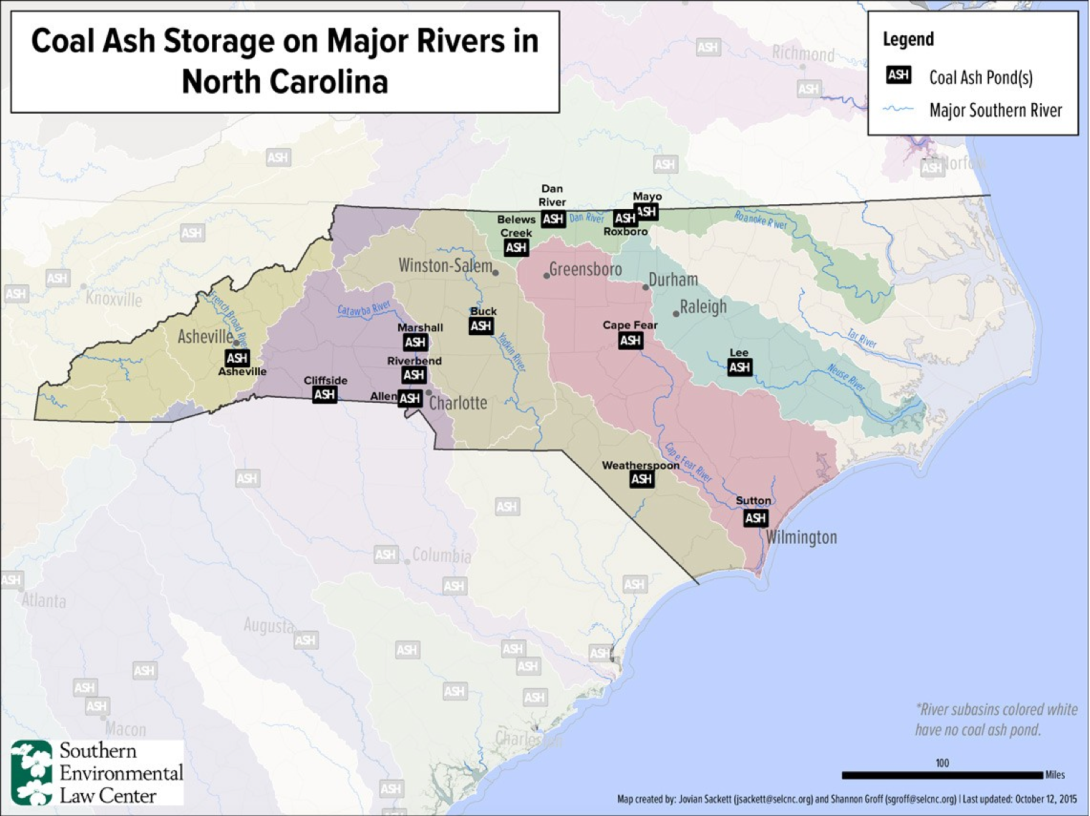Enviros take NC settlement over Duke Energy coal ash pollution to court

Environmental conservation groups have used the courts to try to force Duke Energy to clean up its primitive, leaking coal ash pits located on waterways across North Carolina, but they have been stymied by state regulators. (Map by the Southern Environmental Law Center; click on it for a larger version.)
The Southern Environmental Law Center filed a legal action this week on behalf of conservation groups seeking to overturn a controversial $7 million settlement between Duke Energy and the N.C. Department of Environmental Quality over the utility's extensive coal ash pollution in the state.
The settlement came after Duke appealed a groundwater pollution penalty at the company's Sutton plant near Wilmington. The state levied a $25 million fine against the company earlier this year over pollution from the Sutton coal ash pits, which have contaminated Sutton Lake, a popular fishing spot. Groundwater monitoring near the plant has found levels of cancer-causing arsenic 27 times higher than safe groundwater standards just a half-mile from drinking water wells.
Besides lowering the fine against Duke Energy, the settlement also blocks the state from enforcing groundwater pollution laws at the company's 14 coal-fired plants across North Carolina (see map). The settlement was reached without the involvement or knowledge of the conservation groups that have played a lead role in pressing for action on coal ash pollution through citizen lawsuits under the Clean Water Act and other laws.
"This latest sweetheart settlement shows what happens when Duke Energy and state bureaucrats get in a room together without public scrutiny," SELC Senior Attorney Frank Holleman said in a statement.
SELC said the settlement is the latest example of North Carolina environmental regulators obstructing citizen efforts to force cleanups at Duke Energy's leaking coal ash sites. In early 2013, conservation groups began sending notices that they intended to sue Duke Energy for its coal ash pollution under the citizen enforcement provisions of the Clean Water Act. But DEQ (then known at the Department of Environment and Natural Resources) filed last-minute suits to pre-empt the conservationists' actions.
From the outset, DEQ has resisted the involvement of citizen groups in the lawsuits, trying to limit their participation despite the law. Once the courts granted the groups the right to intervene, DEQ then tried to block the groups' efforts at discovery.
SELC has assembled a fact sheet detailing occasions on which the state has stymied citizen enforcement efforts, beginning in October 2012, when SELC brought legal action over Duke's coal ash pollution before the state's Environmental Management Commission, and continuing even after the company's massive 2014 coal ash spill into the Dan River.
Here's one example from the SELC's fact sheet:
May - October 2013: DEQ negotiates a proposed settlement with Duke Energy behind close doors, without participation of citizen groups. The settlement does not require Duke Energy to clean up any pollution or move any coal ash. Almost 5,000 people and organizations submit comments against the settlement. One person—a Duke employee—comments in support of it. DEQ asks court to approve the settlement, despite overwhelming opposition by the people of North Carolina.
Here's another:
May 15, 2015: DEQ asks a judge to stop citizens groups from conducting discovery in the state court cases. DEQ had already agreed privately with Duke not to conduct any discovery. The court denied the request.
SELC's legal challenge also accuses the administrative law judge who presided over the settlement agreement of having "veered far outside" the narrow issue of the Sutton penalty. It says his order "significantly overstepped its authority" and is "unsupported by substantial evidence," "arbitrary and capricious," "made upon unlawful procedure," and "affected by other errors of law."
The judge in the case was Phil Berger Jr., the former Rockingham County District Attorney who ran unsuccessfully for Congress last year; he's also the son of North Carolina Senate President Pro Tem Phil Berger Sr. Berger Jr.'s congressional campaign received $3,000 in donations from Duke Energy, according to the National Institute on Money in State Politics, which also reports that Berger Sr. is the top recipient of Duke Energy contributions among individual candidates at $47,000.
The groups involved in the latest legal challenge being brought by SELC are Cape Fear River Watch, MountainTrue, Roanoke River Basin Association, Sound Rivers, Waterkeeper Alliance and Winyah Rivers Foundation.
Tags
Sue Sturgis
Sue is the former editorial director of Facing South and the Institute for Southern Studies.
